
The Outer Worlds 2 Review
In many ways, it's easier to write about great games and bad games then it is to write about average games. With great games, a writer can gush about whatever they really enjoyed, and hope that the feelings pass through the writing into you as you read. With bad games, it's easy to pick apart why the game fails to meet expectations, standards, and so on - all in the service of helping readers make an informed purchasing choice. The Outer Worlds 2 is a little difficult to write about, because it is neither great nor terrible, a fascinating mingling of the strong and weak, the refined and underdeveloped - and it's all made more complicated by the fact that this is a game saddled with external baggage that makes a very strong case for not buying it at all. That all makes this a complicated review to express.
The Outer Worlds 2 is a shooter RPG, much like its predecessor (or, if you've never played The Outer Worlds before, something like a Fallout - the series is the brainchild of two of Fallout's co-creators, and in many ways could be considered a spiritual successor). Steeped heavily in sardonic writing, the game takes the player to a land of extremes: what if capitalism, religion, and so on became hyper-absurd and advanced to the point that an invading army was built out of corporate stooges, all hell-bent on selling shitty products (in space)? You play as the Commander, a member of the Earth Directorate, a sort of peacekeeper police officer tasked with bringing order to the fringe worlds of the Arcadia region - which is basically a string of human colonies.
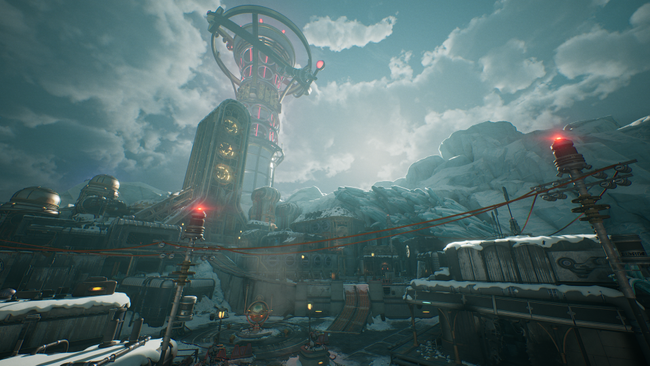
In true shooter RPG fashion, you can build your character any which way you like, highlighting one of the strengths of the game. As you create a character, you select a number of skills and traits to form how your playthrough will go. Will you prefer to use guns to solve your problems for you, or will you try to silver-tongue your way through a conversation and avoid conflict? There are a number of skills, but a limited amount of points, so it's impossible for you to master them all - and throughout my playthrough, no one skill seemed to outshine the others, so you can find a use for everything, including skills like Medicine.
It's important to note that, despite a few extremely optional areas, the game takes great pains to prevent you from being locked out of an area. For example: let's say you need to get into a very specific room of a building. The front door, unfortunately, requires Engineering or Brawny to force open, and you don't have those skills. Through the crack in the door, however, you can see a vent in the background. After some more searching, you come across a different door and a terminal. The terminal requires Hack to open, but the door itself requires Lockpick. So long as you have one of those four abilities at a reasonable level, you can typically find your way into most spaces, and barring that, often just find a key lying around or on a body. It never feels unfair, even when you are occasionally locked out of places because the game has clearly been carefully balanced to make you value your skill choices.
This is pretty important since the game's designers have made a conscious choice to deny players the ability to respec and reset character progression - you're expected to live with your choices. This design choice won't be for everyone, but it speaks to a delightful hard commitment to meaningful role-playing, rather than just paying out for a respec so you can unlock a specific door or pass a certain important speech check. It perhaps doesn't surprise that a website such as ours would approve.
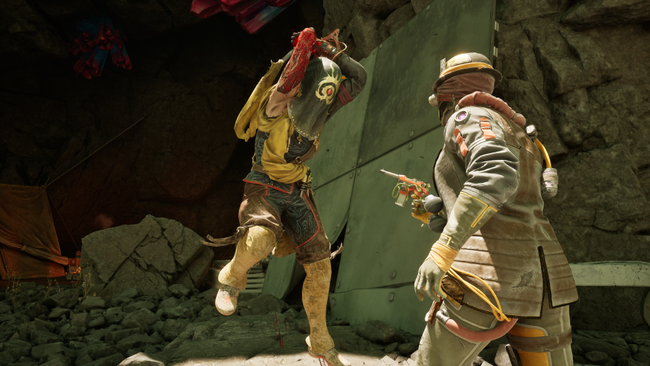
While creating your character, you are also allowed to pick traits, which are cornerstone buffs for your character that define your build. You can pick up to two traits, but if you select a second, you must also take a flaw as well. This is mostly where The Outer Worlds 2 shines - the flaws are all smartly built to be a large detriment, but not so large that it doesn't seem worth it. I personally went with the Dumb flaw, and if you were to buy this game, I'd recommend grabbing it as well. It does force you to lock out several skills (meaning that you will never, ever succeed a check with these skills or be able to invest points into them), but it unlocks some of the funniest dialogue in the game, leaning into the game's humor, which is another of its strengths.
You see, The Outer Worlds 2 takes our capitalist reality and stretches it to its absolute limit. Soldiers singing about how much they love some gross-ass canned bratwurst, greeting travelers by reminding them to buy products from them or complaining about working for 20 hours a day (literally). Mathematicians trying to "help" war refugees by quoting scripture at them and ignoring their very real survival needs, attempting to divine the future via complex equations while ignoring the present. A military force that scrubs out individualism to the degree that if you have a stray thought not related to "the mission", you're sent to a re-education camp where they flash-fry your brain into submission.
The way the game highlights the dangers of extremism in any direction is not subtle, but for this type of critique, I don't think it necessarily needs to be. Auntie's Choice (the hyper-capitalist faction) shows off the dangers of capitalistic egress with the type of finesse that a brick through a window would carry. Soldiers (labeled things like Corporate Liaison) regularly work 16+ hour shifts, and require stims (appropriately branded Auntie's Choice, of course) to push their bodies past the need for trivial things like "rest" and "life balance". Every bullet they fire comes out of their paycheck, they can only consume Auntie's Choice food and beverage, and each and every member that you see talks about work in the most corporate sense of the word. "I'm gonna climb that corporate ladder" - brother, you are carrying a bio-plasma rifle hunting lizards on a snow planet, what corporate ladder are you talking about? It's grindset mentality at its worst.
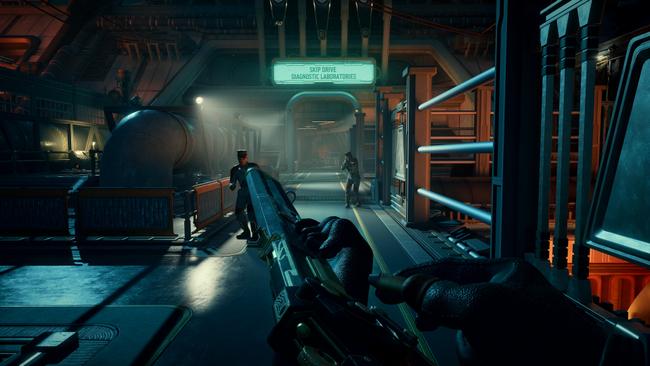
The other faction you can get involved with, The Order, instead focuses on the danger of "missing the forest for the trees". The Order believes in something called "The Absolute Equation", an unsolvable equation that, if it were to be solved, would end strife and ascend mortals to a higher plane of existence. It is, by its very nature, contradictory - something that faith in any higher power tends to be - yet the pursuit of these calculations drives The Order beyond rational religious fervor. I mentioned it earlier, but there's a very real problem with a group that claims to be righteous by mathematical right and promises of a better future that ignores the realities of the present.
In one town, you have to solve a dispute between war refugees occupying much-needed space and the wishes of The Order, who have calculated that the space they wish to inhabit will, at some point in the future, be subject to a massive destruction event of some kind. In order to inform your decision, you have to speak with the denizens of the refugee camp, and many of The Order are so occupied with the thought of teaching the refugees to do math good that they ignore the very real and present fact that there aren't enough beds and food for everyone.
The Outer Worlds 2 is full of moments like these, where extremely good writing strips away the veneer of each form of governance and lays bare the problems with each, and it's made all the better with some excellent companions that serve as a foil to examine them with. Your motley crew can be packed with people of all ideologies, representing a more moderate look at each of them (or, well, approaching moderate in some cases). For example, Tristan is an "Arbiter", a Judge Dredd-like from the Protectorate, the main villains in the game. He is normally able to exercise complete authority wherever he goes, punishing any form of speech that doesn't immediately line up with Protectorate goals. He chooses to join you after realizing that brute force and authority don't mean a hill of beans in non-Protectorate territory, and over time comes to terms with what actual justice is, compared to what he has been taught his entire life.
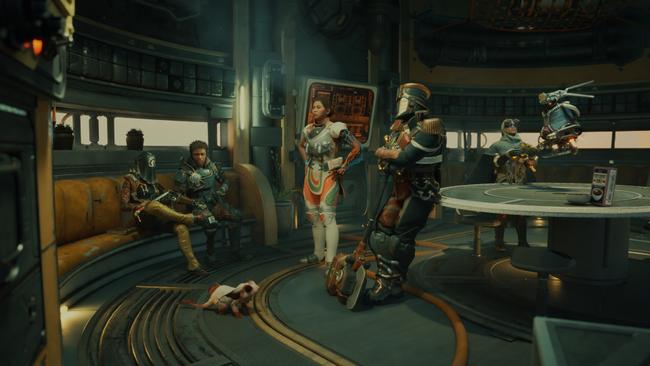
The companions are mostly good, but unfortunately, some come with issues. Inez is the prime problem for me, personally. In one scenario, you are tasked with solving a labor dispute between Auntie's Choice management and the workers. Inez is an AC mercenary recently freed from her contract, but she still harbors love for her people. During the negotiations, if you lack the requisite skills to solve the labor dispute peacefully, you must get violent and pick a side. Naturally, I'm going to side with the workers. However, the instant you lay a hand on the mealy-mouthed corporate jerk that wants to actually kill her workers, Inez drags you into conversation and warns you about needless violence towards Auntie's Choice staff. There was no other way to solve this dispute with the skills I had at the time, and you thankfully are given a few grace mistakes with each companion, but it still rubbed me raw how Inez wants to help the oppressed workers in her faction, but takes offense when you actually do something about it. Then again, there's an argument that Inez's attitude here smacks of modern-day liberalism in itself - it very well may be commentary.
The trait and perk system also highlights the (mostly) excellent writing. During your playthrough, certain repeated actions will open you up to Flaws, opportunities that shift your character towards certain playstyles. For example, if you're a sneaky guy crouch-walking everywhere, you will eventually develop Bad Knees, which give you movement speed bonuses while crouched, but also make your knees crack every time you crouch or un-crouch (alerting enemies within 10 yards of you). If you tend to speed through dialogue with the skip feature, eventually you will develop Foot-In-Mouth Syndrome, granting you a flat 15% experience bonus to highlight that speedrunner tendency of yours (but also making all conversation choices randomly selected if you fail to choose quickly enough.)
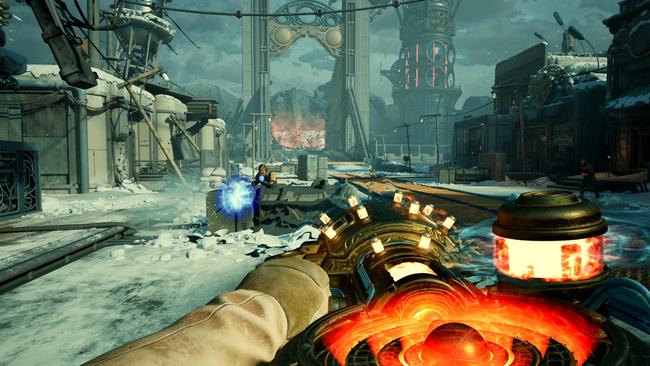
Unfortunately, that's where a lot of my praise for The Outer Worlds 2 ends. The gunplay, while improved over the original outing, doesn't feel that great. Bio-mass weapons in particular just feel unfun to use - arcing shots, extremely long reloads, and the reload animation takes up half your screen for several seconds. This sort of thing is a real problem when the majority of your game is shooting things. The only guns that felt like they had any oomph to them were Heavy Revolvers and Sniper Rifles, and the rest just... lacked something. I'm not able to articulate why, exactly, but despite the numbers I was seeing on my screen, it felt stiff and weak.
You can mod weapons to your liking, but the mod system leaves something to be desired. Weapons come with anywhere from 2 to 3 slots. You can mod a weapon depending on the slot, mods cannot be reused, and they cannot be upgraded in any capacity. This presents a problem where once you find a weapon that matches your build, you will never, ever replace it or upgrade it in any meaningful way. For example, the story grants you a sniper rifle about halfway through the game, and once I found that, I never had to use any other weapon (unless I couldn't one-shot an enemy from stealth, in which case the mini-rocket gun came out.) At least, until I found the Bullet Blender.
You see, early on in the game, if you're observant, you can find a High Security Lockbox, a chest that opens on your ship with Advanced Keycards that you find throughout your journey. In one of these chests is a machine gun called the Bullet Blender. It is a weapon that eclipses all other weapons, regardless of build, because it combines all of your different ammo types into one type and feeds it into a machine gun that never requires you to reload. It's a gun that shreds through bosses even if you don't specialize in machine guns (or guns at all, really). It's...frankly a little overpowered, which is odd to say in a game where the goal is to get the strongest, goofiest weapon in the world and kill things with it.
Exploration in The Outer Worlds 2 is also a little tedious. As you explore areas, you unlock fast-travel points, which is great for side-quests and backtracking, but for large swathes of the planets you explore, you're hoofing it through empty fields or plains, occasionally pockmarked with a stray building or a pack of lizards. There are interesting set-pieces, of course, but the mundane movement through mostly nothing got real old, real fast - and unfortunately the worst planet it happens on is the last one you can access.
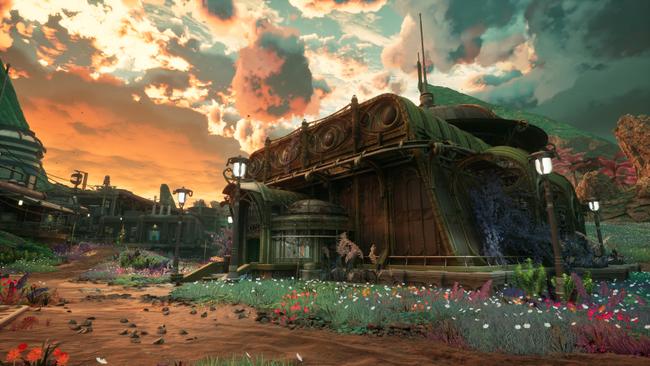
Open field exploration didn't feel that fun, but exploration within dungeons is where the level design really shines. Many of the dungeons you access are full of alternate routes, puzzles to solve, solutions, and alternative solutions to enemies, and hidden caches of treasure. The big tentpole story dungeons are particularly thrilling. Each time I unlocked a new dungeon to explore (and I'm calling them dungeons even though they're usually like...a training facility or a corporate manufacturing plant), I was excited to make my way through it. One dungeon has you navigating a series of trap-filled hallways, before eventually being able to use Hacking to turn the traps on the enemies inside, and completing that side-trip made the rest of the exploration extremely easy. In short, the design allows for meaningful and interesting exploration within dungeons, but in the open world terrain feels pretty lackluster.
Environmental design plays a big part in this, I feel. There's a wealth of extremely interesting and good choices in places like the Auntie's Choice Flagship, the Undisputed Claim, where, from the moment you set foot on the ship, you are inundated with non-stop ads. There is nowhere on the ship (save for the managerial offices, of course) where you can avoid the jingles of Hoarst Wurst, or someone flagging you down to buy something from them, and it shows a level of understanding that seriously impressed me. However, then you travel to the snow planet or the forest planet and, aside from a plethora of plants or rocks that occasionally make weird noises at you, it's a lot of empty space that left me wanting.
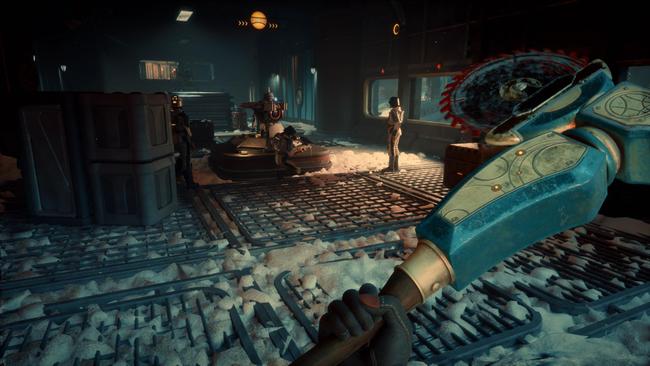
All of this combines to be an above-average experience. The writing, perks/leveling systems, and dungeon exploration are fun, interesting, or intriguing, while the rest of the game feels pretty barren, lackluster, or underwhelming. It's a game of high highs and frequent lows that left me a little unfulfilled upon completion. I've heartily recommended games with far less meat on the proverbial bone - which inexorably brings us to that previously-mentioned external baggage which would challenge the verdict and purchase recommendation even if this was a total all-time classic.
The Outer Worlds 2 is developed by Obsidian Entertainment, a fantastic studio with extremely talented people creating incredible worlds and stories that I, personally, love to death. To say Obsidian is one of my favorite game studios is not an understatement - nearly every game they have developed has been, at the very least, a solid experience, and this game is no different. However, Obsidian is owned by Xbox Game Studios, which is in turn owned by Microsoft. Microsoft is a frustrating and disappointing company at the best of times, and we've this year bore witness to a vandalistic onslaught of layoffs and studio closures. But the core problem is more important than any of that: Microsoft remains on the BDS (Boycott, Divest, Sanction) list in relation to what a UN commission declared a genocide in Gaza.
This, of course, puts studios owned by Microsoft and those who work for them in a terrible position. Obsidian Entertainment surely deserves better. But this is the reality into which The Outer Worlds 2 releases. Our job is to review video games, but in scenarios this severe, it would be irresponsible not to mention the current wider context.
The Outer Worlds 2 is much like its predecessor in that it is a witty, smart, and energetic adventure. Its highs threaten to touch the stratosphere as easily as the protagonist's spaceship - but its lows mine as deep as some of those poor, slaving Auntie's Choice workers. From this site's more specific angle of interest, its role-playing feels more meaningful and satisfying than in its predecessor or Avowed, Obsidian's other recent action RPG. In a vacuum, it's an enjoyable romp - but no entertainment or art exists in a true vacuum, really. Just as The Outer Worlds 2's scathing commentary on consumerism and blind faith reflects on our real world, so too does our real world reflect on it at the time of its release. Like the game's moral quandaries, it's all about player choice - but in the real world, the consequences are real.